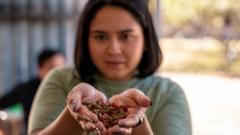Hugo Daniel Chávez, a project manager for Sustenta Honduras, is harnessing the potential of used cooking oil in a country where deep-fried foods dominate the culinary scene. At just 27, Chávez and his team have identified an innovative business opportunity: recycling discarded cooking oil into sustainable soap and dog food. "We are trying to transform waste and give it a second life," he explains.
Every year, Latin America consumes several million tonnes of cooking oil, often used for frying popular foods like chicken and plantain strips. Unfortunately, reusing oil multiple times can lead to harmful compounds, impacting both health and the environment. Improper disposal of used oil can clog plumbing and contaminate waterways, posing a risk to community resources.
In light of these challenges, the young entrepreneurs at Sustenta devised a solution that not only incentivizes responsible disposal but also repurposes waste into useful products. Ricardo Pineda, the NGO's executive director, points out that previous attempts to convert used oil into biodiesel lacked traction in Honduras. Instead, they opted to manufacture items like soap and dog food that cater to local market needs.
By purchasing used cooking oil and providing regular pickups from participating businesses, Sustenta has created a sustainable loop. Their efforts were acknowledged on a global stage when they received a $20,000 prize in the 2023 Youth4Climate Energy Challenge for their innovative approach to sustainability and social impact. The organization also benefits from funding from the Netherlands Embassy, emphasizing their commitment to addressing climate-related challenges while creating green jobs.
Sustenta pays business partners between 2.50 and 3.50 Lempiras (8 to 11 pence) per pound of cooking oil, and they recently secured a contract with Walmart Central America to ensure a steady supply of used oil. This collaboration is vital, given that the black market for cooking oil often competes with sustainable efforts.
The recycled oil is processed at their facility in Comayagua through saponification, a chemical reaction that converts oils into soap. This process is part of their broader aim to foster a circular economy, where waste is minimized and resources are reused.
With plans to sell their products at Walmart, Sustenta can showcase the economic value of turning waste into profit. Their soap, priced at 15 Lempiras (45 pence) per bar, generates considerable revenue, although most funds are reinvested in ongoing projects.
Alongside cooking oil recycling, Sustenta is involved in several initiatives that empower youth and women, the groups most impacted by climate change. Their youthful approach differentiates them from traditional environmental organizations, focusing on actionable solutions instead of confrontation.
As project coordinator Paola Acevedo notes, "We focus on solutions, while others may tackle the problem from different angles." With a team of enthusiastic young individuals motivated to create real change, Sustenta is not only tackling waste but also redefining the relationship between economy and ecology in Honduras.





















